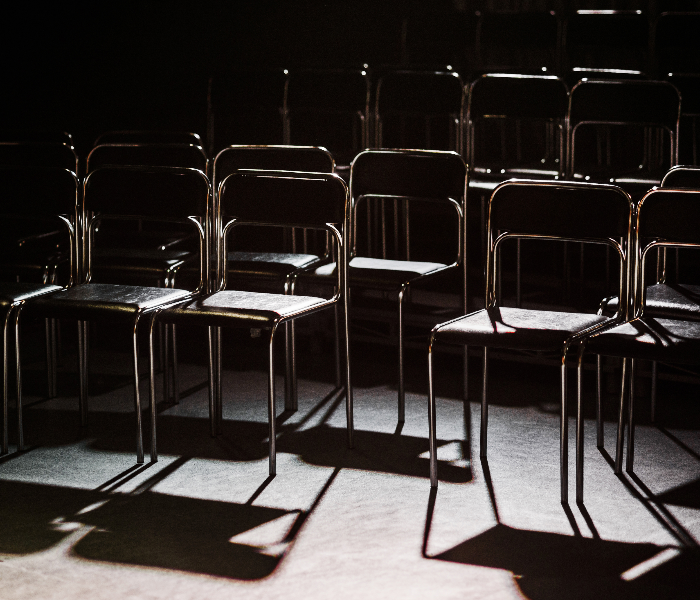How Off-Off Broadway Is Trying to Save Itself (And Where Help Is Needed)
Home > TDF Stages > How Off-Off Broadway Is Trying to Save Itself (And Where Help Is Needed)

Yes, the struggle is real for NYC’s small theatres. But there is hope
—
“People have been writing Off-Off Broadway’s obituary for decades, but I don’t think that’s more true now than any of the other times,” said Talia Corren, the recently appointed co-executive director of the Alliance of Resident Theatres/New York. A few hours later, the news broke that Off-Off Broadway veteran the New Ohio Theatre is shutting down this August after 30 years of genre-defying performances. The outcry was swift and anguished as Off-Off Broadway artists (many of whom prefer the moniker indie theatre) lamented the impending loss, convinced this was yet another sign of the demise of a once-vibrant scene.
But the truth is more complicated and, seemingly, a bit more cautiously optimistic. Dismayed by the deluge of articles covering the health of Broadway while ignoring NYC’s myriad small theatres of less than 100 seats, I began talking to folks in the Off-Off Broadway community a few months ago to get their take. They all had gripes, especially financial ones in a city that’s becoming less affordable by the minute. However, they also acknowledged some heartening developments, such as the recent unveiling of La MaMa Experimental Theatre Club’s renovated building and some brand-new inexpensive rehearsal spaces, including one opened by multiple downtown companies in partnership (including, ironically, the New Ohio).
There’s no question Off-Off Broadway is in transition, though as Corren points out, “The independent theatre community has always been in a constant state of reinvention and innovation,” just like the city itself. So, what does Off-Off Broadway need to survive and thrive? Here are four areas where indie theatre artists want to see progress.
More Stable Spaces
Fewer performance venues closed during the shutdown than anticipated. Even The Secret Theatre, which shuttered in May 2020, ended up reopening in new digs, and the aforementioned New Ohio will remain a home for nonprofit theatre as will the recently purchased Cherry Lane. That said, many rehearsal studios went belly up and some Off-Off Broadway theatres that made it through thanks to Shuttered Venue Operators Grants and the Paycheck Protection Program are now in danger.
“Space—we’ve always needed it and always will,” says Randi Berry, the executive director of IndieSpace, a nonprofit that supports independent theatre-making in NYC, particularly in terms of real estate. Berry has served as an adviser in many of the Off-Off Broadway real estate deals of the past few years and is currently trying to help the Wild Project in the East Village buy its building. Her org also partnered with three downtown stalwarts, HERE, Rattlestick Theater and the soon-to-close New Ohio Theatre, to open the brand-new West Village Rehearsal Co-Op, which offers low-cost rentals to indie artists. The Tank, the Chain Theatre and Theatre Row in Midtown also opened similar spaces within the last year.
“Beyond rehearsals and the actual theatre, space is about being in community with one another,” Berry says. “Our existence was already so unstable and tenuous before COVID with the openings and closings of theatres and constant financial insecurity. There’s a grounding that happens when we get in a space together that makes it possible to keep moving forward.”
Many interviewees mentioned the Commercial Rent Stabilization Act, which has been kicking around for years. If passed, it could help leased theatres hold on. “It’s on the ballot right now,” says Erez Ziv, the Managing Director of FRIGID New York, which presents and live-streams performances at two rented East Village spaces: the Kraine Theatre and Under St. Marks. “Because of all the funding that we as a community got during the shutdown, everybody’s leases are going to go up. My landlord at St. Mark’s told me the other day, ‘There’s the guy in the middle of the block and he pays me three times what you pay me.’ And I was like, ‘You want me to pay you what the weed shop is paying you? That’s not going to happen.'”
That’s why Berry is a big believer in theatres owning their own spaces. “The financial conversation and real estate conversation are one and the same, you can’t divorce them,” she says. “The big asterisk right now—when ticket sales are still not back to what they were before and all the federal support is gone—is how are venues going to pay their arrears? That’s what worries me.”
More Collaborations
Edward Einhorn, the artistic director of the itinerant Untitled Theater Company #61, wistfully recalls the time he mounted a play for one night at The Public Theater as part of Suzan-Lori Parks’ yearlong 365 Days/365 Plays project, which took place not only throughout New York City but at venues across the country. “Parks invited all of these downtown theatre companies to participate—it was this amazing outreach from establishment theatres to indie theatres,” Einhorn says. “I think we particularly need that now, whether it’s established performers or established spaces. That’s my utopian idea. It doesn’t have to be a full run—it was so amazing to have the resources of The Public for just one performance. If the theatre community doesn’t care about us and try to help us, nobody’s going to.”
Last summer, Ty Jones, the producing artistic director of The Classical Theatre of Harlem, had a hit with the award-winning production of Twelfth Night, which was staged for free in Harlem’s Marcus Garvey Park. But getting to mount a two-week encore engagement at NYU Skirball in February raised the show’s profile. “Producers aren’t coming up to Harlem to see us,” Jones says. “At Skirball, they came.” Still, his long-term goal is to create a Harlem classical arts complex that would serve as a destination culture hub. “I actually like the idea of keeping it small—that’s a tough thing for people to grasp,” he says. “It isn’t always about perpetual growth.”
Of course, indie theatres are also supporting each other, sharing email lists, coproducing shows and doling out funding. The Tank recently unveiled its Producers Cohort for early career theatre-makers with annual awards of $15,000, and IndieSpace recently distributed Milk and Eggs (Cost of Living) micro grants to 81 NYC-based indie theatre artists.
“For our model in general, we have the ability to allow people to afford to fail, because we’re not relying on one show, we do a lot of programming,” says Meghan Finn, the artistic director of The Tank, which presents shows in person and online. “That gives flexibility to emerging artists so there’s not that pressure to succeed. When you do that, you get a lot of people who do succeed because they have that freedom to experiment.”
“The 3 p.m. culture calls during the shutdown did a lot to connect us across the industry,” says Ziv from FRIGID New York about the newfound communication between theatres. “Everybody is aware of everybody’s existence. Even the funding organizations are realizing that, instead of giving $100,000 to one place, better to spread it around. So, we’re heading in the right direction, but the push has to remain.”
Finn agrees. “One of the good things to come out of the pandemic is the way the community came together. Suddenly, I’m in conversation with large theatres that never would have even clocked us before, and we’re sharing information. We’re figuring out ways we can cross-pollinate because when push comes to shove, all we have is one another.”
More Press
From 1997 to 2014, indie theatre maven Martin Denton oversaw the now-defunct website nytheatre.com, an invaluable chronicle of Off-Off Broadway. Once it went dark, nothing replaced it. Worse, traditional coverage of Off-Off Broadway shrank. Reviews decreased and listings dwindled. Even seasoned theatre journalists who tried to shine a spotlight on indie theatre often found their columns cut (though Michael Dale is now on Onstage Blog). Despite a few intrepid Substacks, it’s very challenging to get a comprehensive overview of everything going on Off-Off Broadway.
“We’ve lost the support that comes in the way of reviews and press,” says Aimee Todoroff, the managing director of the League of Independent Theater. Since theatre is ephemeral, “we really need other people to form the record of what we’re doing.” Her organization recently took over the New York Innovative Theatre Awards, rechristened the New York Independent Theater Awards, which are in the process of being revamped. One goal is to “build out a platform online where people can see where all indie theatre is happening in one place,” but that takes funding.
For years as coverage has waned, theatre-makers, lovers and journalists have advocated for a nonprofit ProPublica-style publication to cover the scene. There have been some interesting upstarts—3Views on Theater, which is national in scope, and 4Columns, which also covers film, art and music—but nothing dedicated to NYC’s expansive Off-Off Broadway offerings.
So, artists are left vying to get one of the few indie theatre reviews in The New York Times or Time Out New York. “The short blurbs in The New Yorker have such a huge impact for us because the readership is so much wider than anything I could ever pay for,” says Finn from The Tank. “Part of what makes the cachet of NYC is the Off-Off Broadway scene. That’s why new theatre artists are still coming here, to be in this pressure cooker with all these other artists and to see what’s happening at places like The Brick, JACK and The Tank. We need to be able to get above the fray now and again, to get seen, because we’ll never have the marketing dollars to get our voices out there.”
More Audiences
Interviewees had different responses when asked whether they believed audiences for indie theatre were drying up. Einhorn from Untitled Theater Company #61 admitted he had trouble attracting theatregoers to his last production, which was mounted at A.R.T./New York Theatres. But Ziv of FRIGID New York says many offerings at the Kraine and Under St. Marks sell out while acknowledging fewer shows are being produced at the venues overall, in part because so many artists left the city or the industry.
While FRIGID New York recently launched a new membership model, indie theatres rarely offer subscriptions the way many Off-Broadway nonprofits do. So, the easiest way to support Off-Off Broadway theatres is to go see a show and encourage your friends to buy tickets, too.
“For a long time, making theatre in New York City has been a very risky proposition—it’s financially risky and artistically risky,” says Corren from the Alliance of Resident Theatres/New York. “What’s amazing about Off-Off Broadway is that it redistributes that risk so that audiences are also taking a risk,” though mostly in terms of time since indie theatre tickets can be had for as little as $11. “It’s that risk taking that makes great work.”
Donations are also critical. “I think that anybody who cares about a vibrant, inspiring, diverse and interesting theatrical scene in New York City should find a company that you’re excited about,” Corren continues. “Even if you can’t make a large donation, putting your money into those endeavors is so important, because it really does come down to resources in order to keep feeding the ecosystem.”
“Without the circle of theatre, we’re just the Vegas Strip,” Berry from InsideSpace says with a laugh. “You can spend all the time you want on Broadway—I love Broadway!—but it doesn’t work without indie theatre. It’s the research and development wing of the American theatre and it’s where innovation happens.”
TDF MEMBERS: Log in to your account to browse all our theatre and dance offers. Not a TDF member? Consider joining our Go Off-Off and Beyond program, which gives you access to discount tickets to indie theatre for a one-time fee of five bucks.

